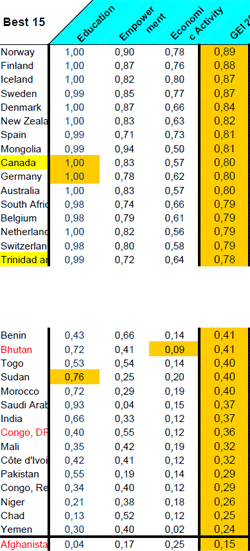Lebanese gender equity is above the Middle East and North African average, says watchdog organization
|
Published on Thu, 2012-03-15 11:39
In terms of gender equity Lebanon is above the Middle East and North African average, and also above neighbouring Syria, although in worst situation than Israel, which bares the best score in the region. This is made apparent by the publication of the Gender Equity Index (GEI) 2012, published by Social Watch on the eve of Women’s International Day, March 8. The index prepared annually by Social Watch measures the gap between women and men in education, the economy and political empowerment. The index is an average of the inequalities in the three dimensions. In literacy, it examines the gender gap in enrolment at all levels; economic participation computes the gaps in income and employment; empowerment measures the gaps in highly qualified jobs, parliament and senior executive positions.
Social Watch measures the gap between women and men, not their wellbeing. Thus, a country in which young men and women have equal access to the university receives a value of 100 on this particular indicator. In the same fashion, a country in which boys and girls are equally barred from completing primary education would also be awarded a value of 100. This does not mean that the quality of education in both cases is the same. It just establishes that, in both cases girls are not less educated than boys. Lebanon’s 55 points rank it among those countries with VERY LOW GEI, but far above (12 points) the Middle East and North African average, which stands at 43, and in a better condition than its neighbour Syria (50), but far below Israel (75). The region is led by Israel, the United Arab Emirates (63) and Kuwait (62). The countries in the region in the worst condition are Morocco (40), Saudi Arabia (37) and Yemen (24). The five levels according to which the index measures the gender gap are: CRITICAL, VERY LOW, LOW, MEDIUM AND ACCEPTABLE. It should be noted that no country has reached 90 points or more, meaning that no country has yet reached the ACCEPTABLE level. The only dimension in which Lebanon reaches an ACCEPTABLE value is education (95 points), while in empowerment and economic participation the country’s performance is much less praiseworthy: 28 and 42 respectively (CRITICAL and VERY LOW). At a world level, the countries that have achieved a better score are Norway (89), Finland (88), and Iceland (87), which places them as countries with a MEDIUM GEI. Out of the 154 countries computed by the 2012 GEI those five in the worst global situation are Congo Rep (29), Niger (26), Tchad (25), Yemen (24) and Afghanistan (15). Social Watch members are spread across all regions. The network fights for the eradication of poverty and its causes, the elimination of all forms of discrimination and racism and to ensure an equitable distribution of wealth and the realization of human rights. Tags: |


